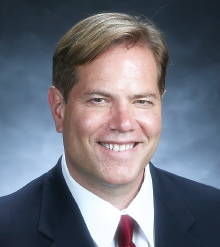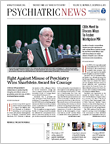Boarding—holding patients with diagnosed or suspected psychiatric disorders for hours or days in emergency departments until inpatient beds are found for them—is good for neither patients nor hospitals, said Scott Zeller, M.D., at IPS: The Mental Health Services Conference in New York in October.
However, the practice remains a problem, said Zeller, chief of psychiatric emergency services for the Alameda Health System in Oakland, Calif. No one would suggest that someone walking in complaining of chest pain or an asthma attack should be told to wait for hours or days before receiving care, he said.
The approach in Oakland is therapeutic from the outset, as distinct from a general emergency department’s need to move psychiatric patients along to other settings for care. Initiating therapy in the emergency department, as Zeller has long advocated, could reduce boarding while benefiting patients
Typically, patients needing psychiatric care who arrive in a general hospital’s emergency department are treated for general medical conditions, but staff there may or may not include psychiatrists or other clinicians to assess and treat their mental health problems.
People with severe mental illness appear to overuse the emergency department since they have few other alternatives for care, added Leslie Zun, M.D., M.B.A., chair and professor of emergency medicine and a professor of psychiatry at the Chicago Medical School and Mount Sinai Hospital in Chicago. About 23 percent are sent home without a consult because of limited resources.
While the nation’s 42,000 emergency physicians can “handle any threat to life or limb,” said Zun, many have not had thorough training on treating people in psychiatric crisis.
Boarding psychiatric patients in an emergency department is both poor medicine and expensive, said Zeller. “The average cost per patient is $2,264, and that’s after the initial triage and [general medical] care they have received,” he said. “That’s the cost for just waiting around.”
Waiting can be difficult for both staff and patients. Sometimes psychiatric patients are placed in special holding areas to await evaluation or are required to wear gowns that are different in color from those of other patients—a sure way of reinforcing stigma and signaling that these patients are not welcome. Zeller has observed cases in which the language or actions of emergency department doctors and nurses engendered agitation in patients rather than built an alliance with them.
His specialized psychiatric emergency department in Oakland sees about 1,500 to 1,800 patients with involuntary psychiatric holds per month.
Police do not bring in patients directly. While at the scene of an incident, they call an ambulance, and the responding EMTs then triage patients to either general emergency departments or the psychiatric emergency department. A psychiatrist is on duty 24 hours a day and meets the ambulance at the door. Patients can also self-refer.
The service has no actual “beds,” just 48 reclining chairs in one large room. Using a collaborative approach, his team focuses on relieving acute crises.
Zeller sees an artificial distinction between “recovery” and “medical” approaches to caring for psychiatric patients in emergency settings. He noted that a $140 million recovery-oriented California grant program frowned on any mention of recovery in applications of hospitals, physicians, or nurses. That approach is far too rigid, he said.
“Better results occur when psychiatrists can combine the two into one program,” he said. “In Oakland, we are mostly staffed by doctors and nurses, but we also use groups and occupational therapy.”
The approach is always collaborative, with team members taking the time to listen and develop relationships with patients.
“We’ll work with them for 10, 15, or 20 hours and then decide if they need hospitalization,” said Zeller. Less than 30 percent are referred to a hospital after that process, and just 1 in 1,000 patients requires restraint or seclusion.
This system has reduced the average boarding time in Alameda County to two hours, and 75 percent of the patients can be successfully discharged.
“We still need hospitals and inpatient beds, but we are able to give better care, save money, and increase access,” said Zeller. That’s a model he and other emergency psychiatrists would like to see emulated more often. ■

